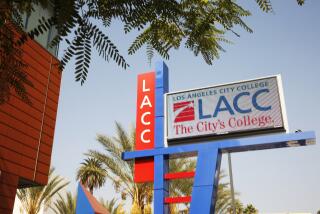Readers React: Since when is the critical thinking learned in college not considered a valuable skill?
To the editor: Bryan Caplan rightly calls attention to the flaws with how many today think about the value of a college education. And while our fixation on a degree’s monetary return belies what a higher education imparts to the individual student and, as a result, society as a whole, so too does Caplan’s focus on “signaling.” (“What students know that experts don’t: School is all about signaling, not skill-building,” Opinion, Feb. 11)
A student’s time in college is marked by challenges that lead to critical growth. The very encounters with subjects that Caplan dismisses are what enable many students to push themselves intellectually, develop critical-reasoning and collaborative-thinking skills, and engage with diverse cultures and perspectives that not only prepare them for their first job, but to become the leaders in their fields and problem-solvers in our communities.
Caplan’s assessment highlights a weakness in academia: our need to more clearly communicate the value of a college education beyond numbers on a spreadsheet. It’s a challenge we must confront before our cultural assumptions start to shape our scholars, and not the other way around.
John Bravman, Lewisburg, Pa.
The writer is president of Bucknell University.
..
To the editor: The most important thing I learned during my education in the 1950s and ’60s was how to learn.
It’s a skill that allowed me to change careers several times. I first recognized this skill when, in the 1980s, I met steel workers who were struggling to learn skills for new jobs. Perhaps today’s test-driven instruction shortchanges skills such as critical thinking and problem-solving, important elements of the mental flexibility needed to learn new things.
It is easy to reject the value of education, but we might do better to consider ways to improve the quality of education instead.
Margaret Hamilton, Portland, Ore.
..
To the editor: As college degrees become more commonplace in this country, their signaling power will weaken, resulting in an academic version of Gresham’s law.
Marquee-name schools will drive out whatever premium is now attached to third-tier institutions. Their very existence will be jeopardized, as parents and students call into question their cost.
Walt Gardner, Los Angeles
The writer is author of Education Week’s Reality Check blog.
..
To the editor: Caplan implies that higher education is a waste of money because it’s just a four-year sleepwalk in which only the sheepskin counts for employment.
What should higher education produce beyond the resume bullet points demanded by a corporate bureaucracy? Above all, minds that can solve the myriad problems we face.
For starters, we need citizens who have learned their civic responsibilities and who know how to realize empowerment via democratic processes. Retired Supreme Court Justice David Souter warned us years ago that democracy dies when the people lack an education in civics — that in a crisis they will turn to a strong man who promises to solve all their problems.
Sam Coleman, Huntington Beach
The writer is a lecturer of Asian studies at Cal State Long Beach.
..
To the editor: Caplan writes that “few of us use history, poetry, higher mathematics, or foreign languages after graduation.” By advocating for “serious on-the-job learning” instead of education in these fields, he is complicit in their denigration.
An understanding of history allows citizens to make educated choices in working to create a society free from the errors of the past. I cannot thank my past English teachers enough for their lessons on classic texts, prose and poetry. They have given me the courage today to critically read a passage and submit a response to a major newspaper.
Education has made a world of difference in how I lead my life — and I hope to lead a life in which I can impart the same skills on others.
Suzie Ting, Los Angeles
Follow the Opinion section on Twitter @latimesopinion and Facebook.
More to Read
A cure for the common opinion
Get thought-provoking perspectives with our weekly newsletter.
You may occasionally receive promotional content from the Los Angeles Times.






